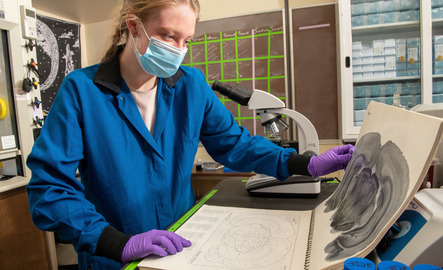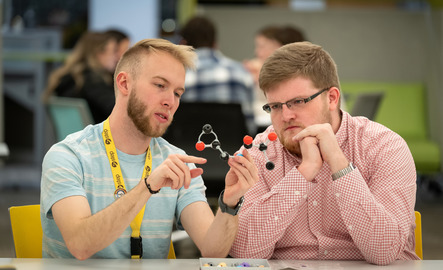Learn More About the Neuroscience Minor
The neuroscience minor is an excellent program for any student preparing for medical
school or a career in health sciences.
All students take at least 17 credit hours, including two required introductory courses
in physiology and neuroscience. Then, students have the opportunity to choose from
a list of advanced electives.
Students must be pursuing an undergraduate degree program to declare a minor in neuroscience.
All courses must be completed with a grade of “C” or better. Courses counted towards
one minor cannot count towards a different minor.

Many UW students find community in student-led clubs and organizations. Here are some of the organizations that may interest you:
- Physiology Club
- Women in Math, Science and Engineering (WiMSE)
- Psychology Club
- Pre-Dental Club
- WWAMI Medical Student Association

What can you do with a minor in neuroscience?
A minor in neuroscience gives you a deeper understanding of how the brain and nervous system influence behavior, health and disease—making it a valuable addition to majors like biology, psychology and physiology. It can prepare you for careers or graduate study in healthcare, research, mental health or biotech by strengthening your scientific foundation and helping you stand out in competitive fields.
Many of our graduates become doctors, physician assistants, dentists, nurses, scientists and educators.
Here are some of the places our health sciences grads have made an impact:
- Mayo Clinic
- University of Colorado Anschutz Medical Campus
- Cheyenne Women’s Clinic
- University of Washington School of Medicine
- Ivinson Memorial Hospital
- Westward Heights Care Center
- Laramie County Community College
- Mountain Gateway Community College
- Medpace
- University of Wyoming
- Infinitus Medical Technologies
- Corvallis Sport and Spine
Neuroscience is a rigorous and rewarding degree that challenges you to think critically and make connections across biology, chemistry, psychology and more. You'll explore fascinating topics like brain function, behavior and neurological disorders, all while developing strong research and analytical skills. It’s a great fit for students who are curious, motivated and excited by the complexity of the human brain and nervous system.
Yes, neuroscience is a great field to work in—especially if you're interested in understanding the brain, solving real-world health challenges or contributing to cutting-edge research. Careers in neuroscience span healthcare, pharmaceuticals, mental health, biotech and academic research, with growing demand for brain-related expertise in areas like aging, neurodegenerative diseases and brain-computer interfaces. It’s a field that offers both intellectual fulfillment and the potential to make a real impact on people’s lives.
Explore UW's Sensory Biology Center
At the University of Wyoming, neuroscience students have the unique opportunity to connect with groundbreaking research through the cutting-edge Sensory Biology Center. Led by Dr. Qian-Quan Sun, the center brings together faculty from zoology, physiology and pharmacy to explore how the brain and nervous system process sensory information. Their work advances treatments for conditions like epilepsy, deafness and dementia, and explores how the nervous system can be targeted to relieve pain.


